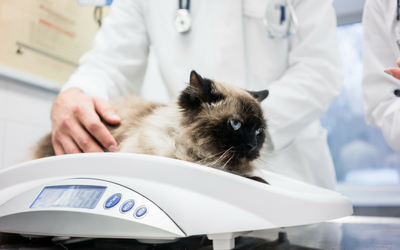
Pet Obesity Awareness Day is October 9th – a day that draws attention to, well, a growing problem. While estimates vary, up to 56% of cats in the United States are overweight! The situation isn’t much better for dogs, with an estimated 60% of dogs being overweight. Being overweight is one thing. Being obese is another! Studies have shown that of those pets classified as overweight, 27-39% of cats and 20% of dogs are obese.
An obese pet is one that is very overweight – at least 30% over what would be considered ideal. For example, if your cat’s ideal weight is 10 lbs (4.5 kg), and she tips the scales at 13 lbs (5.9 kg), she would be considered obese. If your dog’s ideal weight is 60 lbs (27kg), but he weighed in at 78 lbs (35.4 kg), he would be considered obese.
Recent research analyzed weight data from more than 19 million cats across North America from 1985 to 2015 – the biggest study of its kind! The researchers found that as cats age, they gain weight. Not only this, the average weight of our feline friends is on the rise – meaning that the cats from 30 years ago didn’t weigh as much as they do today. Another interesting finding was that 52% of cats in the study had only one body weight noted in their medical record – suggesting that pet owners either did not take their cat in for regular checkups or they took them to different clinics. Generally speaking, cats don’t see their veterinarian as often as dogs do, so it’s entirely conceivable that many cats over the years only got weighed once in their life!
Why are a few extra pounds such a problem? Many pets that are overweight develop osteoarthritis (OA), which is often painful. Not only does the extra weight put additional forces on the joints, but since fat contributes to inflammation, there is more inflammation. OA is often underdiagnosed because cats and dogs are masters of disguise when it comes to pain. In addition to OA, obesity can lead to serious health conditions such as diabetes, heart disease, and cancer.
Preventing obesity starts as soon as you start feeding your pet – from Day 1! Allowing your puppy or kitten to graze all day long can set up a pattern of overeating leading to excessive weight gain and possibly obesity. Once a pet becomes overweight or obese, he already is in the habit of overeating. While it can be a challenge to get your pet to lose weight, your veterinarian can work with you to create a plan to help your pet shed those extra pounds.
That plan may include setting up a feeding schedule rather than free feeding. Your veterinarian will help you determine the ideal amount of food that your pet should eat each day (based on the calorie count of the food) and may even recommend a food that is specifically formulated for weight loss.
Your veterinarian may also recommend an exercise program. No, you won’t need to run your cat around in circles in the backyard, but you can encourage that couch potato of yours to get up and get moving, and burn off a few calories! Move her food dish to different areas in the house to encourage her to move more. By the way, this works for dogs too. Try using a feeding ball that needs to be rolled around to release the kibble. This extends the eating experience as well as encourages movement. Schedule in play time to build exercise into each day. For cats, encourage games of “chase” with a feather toy, laser pointer or squeaky mouse – anything that they will run after. For dogs, use toys, balls, or laser pointers to encourage games of fetch or chase. Be sure to ask your veterinarian about how much exercise you should start with – just like with people, you don’t want to overdo it. Start slow and build up your pet’s stamina.
An important part of a weight loss plan (and too, keeping tabs on overall health) is monitoring your pet’s weight. Taking your pet for a yearly check-up with weigh-in allows your veterinarian to track weight changes as well as detect other changes that may indicate health issues. Another way to keep track of your pet’s weight is to weigh him yourself between veterinary visits. It’s surprising how quickly a pound is gained with just an extra treat here or there!
This October 9th, have a good look at your pet and do a weigh-in. Be honest. Do you have an overweight pet? If so, starting a weight loss plan will help your pet be healthier and happier – now and in the future!